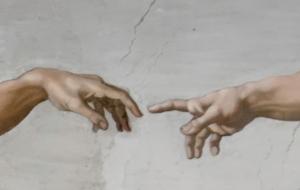
We are contingent beings. No matter how great we become in the world, all that greatness is also contingent. We need to remember this at all times so that we should not become trapped by the way things appear to be in a given moment. If we seem to be great, it is not our doing alone. All that we have, all that we have made of ourselves, could not be without others. Our contingency makes us dependent beings, and so where we find ourselves to be today comes, in part, from what others have given us along the way. This realization should keep us humble. If much of what we have today came from what others have done for us, and what they have given to us, then they can take it away tomorrow. We really can lose everything.
Sadly, we often find ourselves comfortable with what we have become. We take it for granted. We forget where we have come from. We become too self-assured, indeed, we create and believe a vision of ourselves which treats all that we have as ours, not only by right, but by nature. Our egotism leads us astray. We become boastful and proud, ignoring the reality of who and what we really are, contingent beings who rely upon others for our well-being. As contingent beings, we should realize we did not always exist, and so what we view as ours is not ours out of necessity or nature, but rather, as a part of the gift which God has given us. For God has given us life. God has given us all those qualities and gifts which we claim to be ours. They are all a part of the gift of grace which God has given to us. Without that grace, we would not even exist, for our existence is the first of those graces which we have received from God.
As contingent beings, all that we have is dependent upon God. Even those things which others share with us, those things which we use which seem to have no relation to God, ultimately derive from God’s benevolent grace which God gave to creation. This means we should not boast about ourselves. We should not let vainglory get the best of us. For if we do so, if we try to assert what is ours by grace is ours by nature, we risk falling from grace and finding out how little we are without it. God does not want this to happen. God has consistently provided us things in our lives to remind us of our contingent existence so that in and through them, we are reminded not to be boastful and proud, but thankful for what we have.
We must rely upon grace. We must accept we are contingent being who cannot do all things ourselves. We must cooperate with grace so that in and through it, we find ourselves growing and becoming ever greater. In this fashion, uniting ourselves to grace and allowing it to transform us and make us great, we will find our true happiness and joy; through it, we will find fulfillment in life. And, until we are perfect, until we have perfectly united ourselves with grace, and find ourselves free from any and all blemish, we will find ourselves like Paul, having thorns in the flesh, reminding us of our contingent nature so that we know we need to continue to rely upon grace and not ourselves:
And to keep me from being too elated by the abundance of revelations, a thorn was given me in the flesh, a messenger of Satan, to harass me, to keep me from being too elated. Three times I besought the Lord about this, that it should leave me; but he said to me, “My grace is sufficient for you, for my power is made perfect in weakness.” I will all the more gladly boast of my weaknesses, that the power of Christ may rest upon me (2 Cor. 12:7-9 RSV).
There are many speculations as to what Paul’s thorn in the flesh could have been. What is important is not what it was, but the fact that it served to keep Paul humble. It showed Paul his own contingent nature, to help him realize all that he had attained could be taken away from him if he stopped cooperating with grace. However elevated he had become, he was still a contingent being, and that contingency could and would find ways to manifest itself in the midst of Paul’s life. Paul, after all, mentioned his thorn in the flesh as he was recounting his own great mystical experience, the experience which transformed him and not only made him a Christian, but a leader among the early Christians. In the midst of all the grace he had received, in the midst of all the glory he experienced, his pride could have led him astray; but he was not yet perfect, and so experiencing that thorn in the flesh, he was reminded of this and used it to fight against the pride which he otherwise could have had. His acceptance of his contingency and the weakness entailed in it allowed him to remain open to grace and find himself slowly becoming perfected by that grace. We need to realize the same; we need to accept that our weakness presents to us the means by which God’s grace can come to us, lift us up, and make us truly great; it is only by accepting our contingency and the weakness inherent in being contingent beings can we truly find the glory which we seek.
To embrace this contingency, we must also open ourselves up to others, realizing that they are also contingent beings. They are like us. Their lives might be different. Their personalities might be different. Their temptations and weaknesses might be different, but behind it all, they are contingent beings with their own problems, with their own weaknesses, with their own needs, whether or not they realize it themselves. We need them and they need us. We have gifts which we can use to help them in their weaknesses, even as they have been given gifts which can help us in ours. We are to be merciful to others, including those who would be our enemies, because embracing mercy in this way means we recognize and understand the significance of such contingency and our own weakness. When we mess up, when we make mistakes, we want mercy and often get it; but if we are unwilling to give it to others, to show them the love which they are meant to have, we risk losing that mercy ourselves. Thus, as Jesus said, we should do unto others as we would have them do unto us:
And as you wish that men would do to you, do so to them. “If you love those who love you, what credit is that to you? For even sinners love those who love them. And if you do good to those who do good to you, what credit is that to you? For even sinners do the same. And if you lend to those from whom you hope to receive, what credit is that to you? Even sinners lend to sinners, to receive as much again. But love your enemies, and do good, and lend, expecting nothing in return; and your reward will be great, and you will be sons of the Most High; for he is kind to the ungrateful and the selfish. Be merciful, even as your Father is merciful (Lk. 6:31-36 RSV).
We must embrace our contingency, to see it for what it is. It means we are inherently weak, for we come out of non-existence, and that non-existence threatens to overtake us and all that we have made of ourselves in and through our existence. But that contingency also means we can change and become something greater than we are today, for the first great change we experienced, that of non-existence to existence, already demonstrated to us how this is possible. Change relies upon contingency; not only would necessary beings not need to change, their necessity would preclude the possibility of such change. We are contingent, and so we, unlike necessary beings, that is, unlike God, are not self-sufficient; if we forget that, if we become boastful and proud, thinking ourselves to be great, we will no longer seek the grace which we need to change for the better. Without that grace, we will find ourselves using up all the potential stored in us and slowly we will find our very being to be in decline as our foundational non-existence threatens to overtake us once again. Our contingency thus allows us to become great, but only if we accept the fact that we are not great in and of ourselves. We must embrace the inherent weakness contained in contingency, for then through it, we are capable of opening up to God, to realize our contingency is dependent upon God’s necessity. And once we do this, we will not put anything in our way from receiving the grace which God wants to give to us. It is our contingency which allows that grace to change us and make us better; if we cooperate with it, we will find it purify us and make us so that that we will become through grace what we can and should never presume to be by nature.
Stay in touch! Like A Little Bit of Nothing on Facebook.
If you liked what you read, please consider sharing it with your friends and family!













